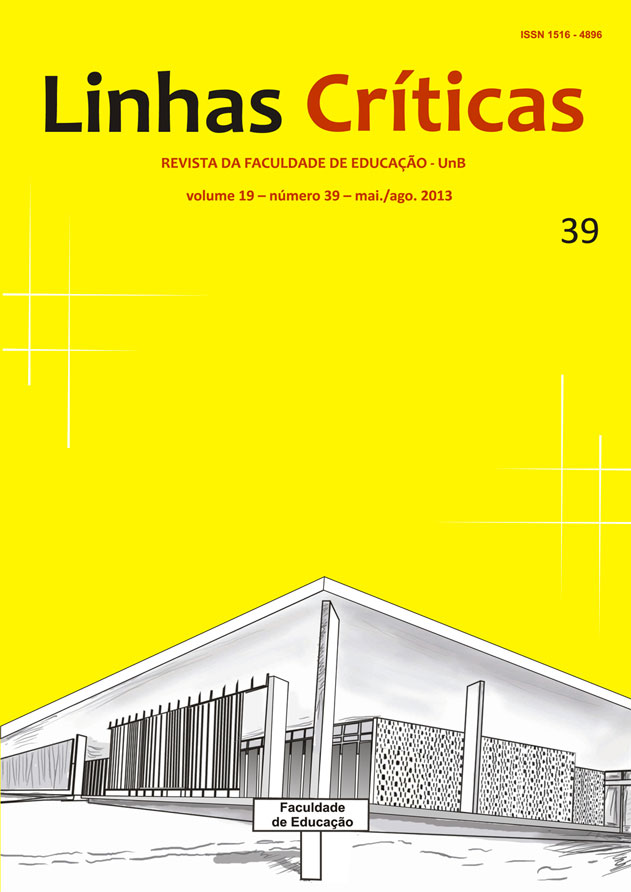Social representations of learning cycles among undergraduates in education
DOI:
https://doi.org/10.26512/lc.v19i39.4129Keywords:
Social representations, Learning cycles, Undergraduates in EducationAbstract
This article aims to describe the possible central nucleus of the social representations of learning cycles among students of education. The basic reference was the theory of social representations, particularly the structural approach proposed by Abric (1998). The research was conducted with 200 students in different stages of the course at the Federal University of Pernambuco. The collection procedure was the technique of free association, whose resulting words were processed with EVOC software. The results suggest that the students are constructing social representations that differ from the guiding principles of the proposal of learning cycles.
Downloads
References
ABRIC, Jean Claude.Abordagem estrutural das representações sociais. Trad. Pedro Humberto de Faria. In: MOREIRA, A S. P; OLIVEIRA, D. C. Estudos interdisciplinares de representação social. Goiânia-GO: Editora AB, 1998. p. 27-38.
ALAVARSE, Ocimar Munhoz. A organização do ensino fundamental em ciclos: algumas questões. Revista brasileira de educação. Rio de Janeiro-RJ, v. 14, n. 40, p. 35-50, jan./abr. 2009.
ALVES-MAZZOTTI, Alda Judith. Representações sociais: aspectos teóricos e aplicações à educação. Em aberto. Brasília-DF, v. 14, n. 61, p. 60-78, jan./mar. 1994.
ANICETO, Rosimere de Almeida. Entre discursos e práticas nos ciclos de aprendizagem:as representações sociais dos professores. 2011. 282 f. Dissertação (Mestrado em Educação) ”“ Programa de Pós-Graduação, Universidade Federal de Pernambuco, 2011.
LIMA, Andreza Maria de. O “bom aluno” nas representações sociais de professoras da rede municipal de ensino do Recife. 2009. 379 f. Dissertação (Mestrado em Educação) ”“ Programa de Pós-Graduação, Universidade Federal de Pernambuco, 2009.
MACHADO, Laêda Bezerra; ANICETO, Rosimere de Almeida. Núcleo central e periferia das representações sociais de ciclos de aprendizagem entre professores. Ensaio: avaliação e políticas públicas em educação. Rio de Janeiro-RJ, v.18, n.67, p.345-363, abr./jun. 2010.
MACHADO, Laêda Bezerra. Eles “passam de bolo” e ficam cada vez mais analfabetos: discutindo as representações sociais de ciclos de aprendizagem entre professores. Revista psicologia da educação. São Paulo-SP, v. 24, p. 111-128. jan./jun. 2007.
MAINARDES, Jefferson. A escola em ciclos: fundamentos e debates. São Paulo-SP: Cortez, 2009.
OLIVEIRA, Denize Cristina de; MARQUES, Sérgio Correia; GOMES, Antônio Marcos; TEIXEIRA, Maria Cristina Trigueiro. Análise das evocações livres: uma técnica de análise estrutural das representações sociais. In: MOREIRA, Antônia Silva Paredes; CAMARGO, Brígido Vizeu; JESUÃNO, Jorge Correia; NOBREGA, Sheva Maia. Perspectivas teórico-metodológicas em representações sociais. João Pessoa-PB: Editora UFPB, 2005. p. 573-606.
RECIFE, Secretaria de Educação. Diretoria-Geral do Ensino. Tempos de aprendizagem, identidade cidadã e organização da educação escolar em ciclos. Recife-PE: Secretaria de Educação, 2003.
Downloads
Published
How to Cite
Issue
Section
License
Copyright (c) 2016 Linhas Críticas

This work is licensed under a Creative Commons Attribution 4.0 International License.
Authors who publish in this journal agree to the following terms:
-Authors maintains the copyright and grants the journal the right of first publication, the work being simultaneously licensed under the Creative Commons Attribution License which allows the sharing of the work with recognition of the authorship of the work and initial publication in this journal.
- Authors are authorized to enter into additional contracts separately, for non-exclusive distribution of the version of the work published in this journal (eg publish in institutional repository or as a book chapter), with acknowledgment of authorship and initial publication in this journal.
-Authorers are allowed and encouraged to publish and distribute their work online (eg in institutional repositories or on their personal page) at any point before or during the editorial process, as this can generate productive changes as well as increase the impact and the citation of published work (See The Effect of Free Access).



